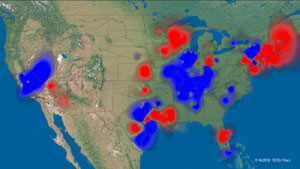Stat of the Week Winner: November 24 – 30 2012
Congratulations to Eva Laurenson for her excellent nomination of the NZ Herald’s article entitled “Manukau ‘luckiest’ place for Lotto”:
What does ‘luckiest’ in this title mean? Well to the average person ( I asked a few) they interpreted that title as ” I would have a higher chance of winning Lotto if I bought my ticket from a Manukau store compared to another store from a different suburb in Auckland.” Is this really the case? I doubt it. The article ranks Manukau ‘luckiest’ because it is the suburb with the highest total paid out first division amount. However no where did they take into account the total sales of Lotto tickets in each suburb. I think if you took this into account you’d see that Manukau sells alot more tickets than some of these other suburbs in Auckland. So even though Manukau can boast 55 mil in first division prizes we have no idea whether that is 55 mil out of 100 mill worth of ticket sales or 55 mil out of 1 bill worth of ticket sales. Some of the other suburbs may have a lesser amount of first division payouts compared to Manuaku but could have a greater proportion of first division payouts compared to ticket sales. Hence if that was true, your chance of winning first division given that you bought your ticket in that other suburb would be greater than (the same probability measured for) Manukau. Therefore I think there isn’t sufficient information provided to make this claim.
What I think the article could say is ‘given I won first division, the chances that I bought my ticket in Manukau are ____ times the chance that I bought it somewhere else.’ Something to this effect could be derived from the information presented by the herald article and it makes a bit of sense. Is this what the article wrote though? Not at all. They summarised this finding into “Manukau is the luckiest Lotto suburb in Auckland.” Please! This screams misleading. As discussed above, there simply isn’t enough information to justify labelling Manukau the ‘luckiest’ suburb for Lotto. People have a clear idea of what it means to be lucky and that generally is that they have an increased chance of winning. This is not the conclusion you can draw from the information they provided and in this case I believe the herald got it wrong.
I also think, although probably not the authors intentions, labelling Manukau as the ‘luckiest’ suburb has the danger of enticing people to spend more on Lotto. This article published earlier in the year by the NZ herald noted that “Many South Auckland suburbs featured among those which gambled away the most money. Mangere Bridge, Flat Bush, Manukau and Manurewa were in the top dozen suburbs.”
Even though the article was talking about the pokies, Lotto is just another form of gambling. We shouldn’t be condemming one and sending a rosy message about another, especially to communities who are struggling as it is.Overall I think this should be the Stat of the week because using ‘lucky’ was a nice little pun but in effect mislead people regarding their chances of winning first division depending on where they bought their ticket.
Secondly it seems wrong to label a suburb ‘luckiest’ and potentially encourage a community to spend more on Lotto there when it is known that it is a compartively poorer area than other Auckland suburbs and spends alot of money on gambling as it is.
Thomas expanded on this, saying:
This looks as if it’s claiming that tickets bought in Manukau have been more likely to win. If this was true, it would still be useless, because future lotto draws are independent of past ones.
It’s even more useless because there is no denominator: not tickets sold, not people in the suburb, not even number of Lotto outlets in the suburb.
What the statistic, and the accompanying infographic, really identifies is the suburbs that lose the most money on Lotto. That’s why Manukau and Otara are ‘lucky’ and Mt Eden and Remuera are ‘unlucky’, the sort of willfully perverse misrepresentation of the role of chance that you more usually see in right-wing US outlets.

